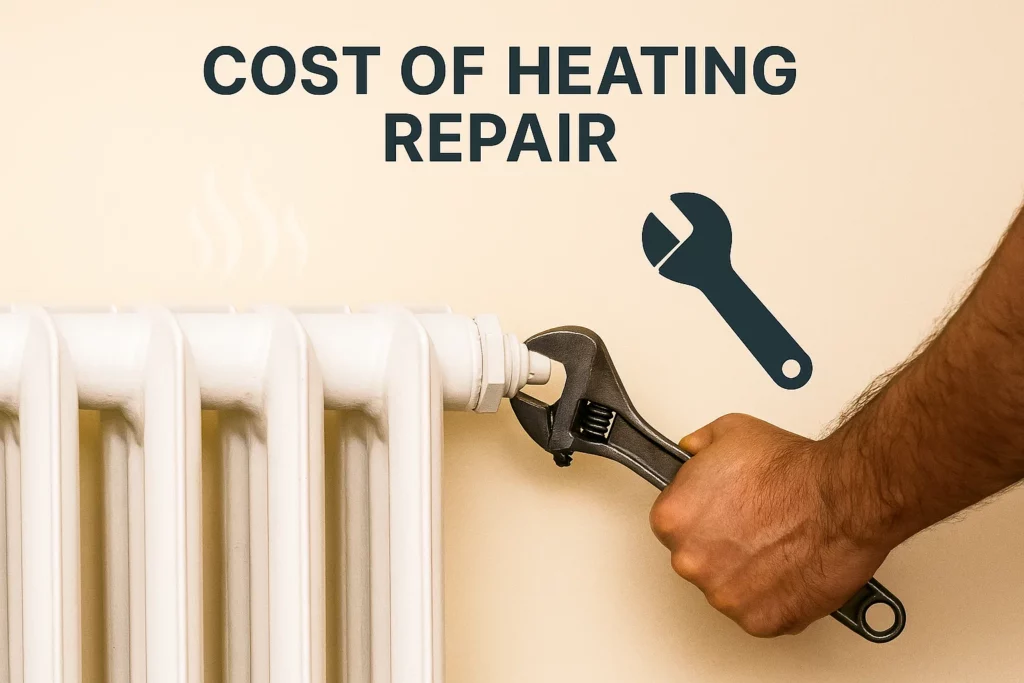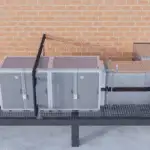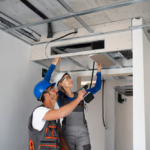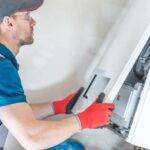As a homeowner, you know how vital a working heating system is. When it breaks, it can be stressful and expensive. Knowing about heating repair costs helps you plan and budget for upkeep. This way, you won’t be surprised by sudden bills.
Our company offers excellent HVAC services to keep your home cozy all year. We aim to help you Stay Cool. Breathe Easy. Live in High Comfort. A dependable HVAC system means fewer emergency repairs and less cost.
Key Takeaways
- Understanding heating repair costs helps you budget for maintenance.
- A reliable HVAC system can prevent emergency repairs.
- Regular maintenance is key to extending the life of your heating system.
- HVAC repair costs can vary depending on the type of repair needed.
- Being prepared can help you avoid unexpected expenses.
- Top-tier HVAC solutions can provide peace of mind and comfort.
Understanding Your Heating System
Knowing how your heating system works can help spot problems early. It’s made up of many parts that work together to keep your home cozy.
Common Types of Heating Systems in American Homes
In American homes, you’ll find different heating systems. These include forced-air systems, heat pumps, boilers, and radiant floor heating systems. Each has its own benefits.
- Forced-air systems use ducts to spread warm air around the house.
- Heat pumps move heat from one place to another.
- Boilers heat water or steam, which is then sent through radiators or underfloor pipes.
How Heating Systems Work
Heating systems make heat from fuel like natural gas, electricity, or oil. They spread this warmth around the house. This process involves heat exchangers, burners, and fans working together.
The Lifespan of Different Heating Components
The life span of heating parts varies a lot. For example, a furnace can last 15 to 20 years. Heat pumps usually last 10 to 15 years. Knowing this helps you plan for upkeep and when you might need to replace parts.
| Component | Average Lifespan (Years) |
| Furnace | 15-20 |
| Heat Pump | 10-15 |
| Boiler | 15-30 |
Signs Your Heating System Needs Repair
Your heating system is key to keeping your home cozy in the cold months. Problems with it can cause your energy bills to rise, make your system less efficient, and even lead to a breakdown.
Warning Signs You Shouldn’t Ignore
There are several signs that your heating system needs repair. These include:
- Increased energy bills without a corresponding increase in usage
- Unusual noises coming from the heating system, such as banging, clanking, or whistling sounds
- Inconsistent heating throughout your home, with some rooms being warmer or cooler than others
- A noticeable decrease in the system’s heating performance
If you see any of these signs, it’s important to fix them quickly. This can prevent more damage and keep you safe.
Emergency vs. Non-Emergency Heating Issues
Not all heating problems are urgent, but some are. For example, losing all heat during very cold weather is an emergency. Also, if you smell gas or think there’s a leak, turn off your system and call a pro right away.
But, if your system just isn’t as efficient or makes a little noise, it’s not as urgent. Yet, it’s wise to have a pro check it out to stop bigger problems.
When to Call a Professional
If you’re seeing any warning signs or emergency issues, it’s time to call a pro. A skilled HVAC technician can find the problem, give you a repair estimate, and make sure your system is working right.
Choose a trusted HVAC service for the best solutions. They’ll help you fix your heating system, keeping your home warm and comfy all winter.
What is the Cost of Heating Repair? Breaking Down the Numbers
As a homeowner, you might face heating repair costs. Knowing these costs helps you budget and make smart choices about your heating system.
National Average Costs for Heating Repairs
The average cost for heating repairs varies. It usually falls between $150 and $500. But, complex repairs can cost over $1,000. Keep in mind, these are just averages. Costs can change based on your heating system, the repair, and where you live.
Price Ranges by Repair Type
Repair types have different price ranges. For example:
- Simple repairs, like replacing a thermostat, cost between $100 and $300.
- Fixing a faulty igniter or heating element can cost $200 to $600.
- Major repairs, like fixing a heat exchanger or blower motor, can be $500 to $1,500 or more.
These are just estimates. Your actual cost might be different based on your situation.
Regional Cost Variations Across the United States
Heating repair costs also vary by region. This is due to labor costs, local rules, and technician availability. For example:
| Region | Average Cost Range |
| Northeast | $200 – $700 |
| South | $150 – $500 |
| Midwest | $180 – $600 |
| West | $250 – $800 |
We ensure your home is comfortable all year. Knowing these regional differences helps you plan for heating repair costs better.
Factors That Influence Heating Repair Costs
Knowing what affects heating repair costs helps you plan your budget. When your heating system breaks down, it’s important to understand the repair cost factors. This way, you can prepare for any expenses.
System Type and Age
The age and type of your heating system greatly impact repair costs. Older systems or those with complex designs often need more expensive parts and labor. For example, older furnaces might need special or hard-to-find parts, which can increase the cost.
Part Availability and Quality
The cost of repair parts can vary a lot. High-quality parts might be pricier but last longer and work better. Parts that are hard to find can also raise costs due to shipping and handling.
Labor Costs and Technician Expertise
Labor costs are a big part of heating repair costs. The skill level of the technician can affect how much you pay. More skilled technicians might charge more, but they usually do a better job. This can save you money in the long run.
Seasonal Demand and Emergency Services
Seasonal demand can also affect repair costs, with prices going up in peak seasons. Emergency repairs, which happen outside regular hours, can cost even more. Planning ahead and fixing issues early can help avoid these extra costs.
| Factor | Impact on Cost | Potential Savings |
| System Age | Older systems may require more expensive parts | Regular maintenance can extend system life |
| Part Quality | High-quality parts are more expensive upfront | Better performance and longer lifespan |
| Labor Costs | Experienced technicians charge higher rates | Efficient repairs can reduce overall costs |
| Seasonal Demand | Prices surge during peak heating seasons | Plan maintenance during off-peak seasons |
Understanding these factors helps you manage heating repair costs better. Being informed and proactive can help you save money. It’s all about planning and knowing what to expect.
Common Heating Repairs and Their Costs
Knowing about common heating repairs and their costs can help you make smart choices. As a homeowner, knowing these costs can help you plan for repairs and budget better.
Furnace Repairs
Furnace repairs can cost a lot, depending on the problem. Some common repairs include:
Ignition and Pilot Light Issues
Ignition and pilot light problems are common. They can cost between $150 to $300 to fix. These issues often happen because of faulty ignition systems or pilot light malfunctions.
Blower Motor Problems
Blower motor issues can be pricey, costing between $250 to $800. These problems need a pro to diagnose and fix.
Heat Pump Repairs
Heat pumps are a popular heating choice. Their repair costs vary based on the problem. Some common repairs include:
Refrigerant Leaks
Refrigerant leaks can be expensive, costing $200 to $1,500 to fix. These leaks can make your system less efficient and increase your energy bills.
Compressor Issues
Compressor problems are serious and can cost $600 to $2,000 to fix. Fixing a compressor failure needs a lot of technical skill.
Boiler Repairs
Boiler repairs are common and can vary in cost. Some typical repairs include:
Circulator Pump Failures
Circulator pump failures can cost $250 to $700 to fix. These pumps are key for moving hot water through your system.
Pressure Problems
Boiler pressure issues are usually less expensive, costing $150 to $400. These problems often need adjustments or repairs to the pressure system.
| Repair Type | Cost Range |
| Ignition/Pilot Light Issues | $150-$300 |
| Blower Motor Problems | $250-$800 |
| Refrigerant Leaks | $200-$1,500 |
| Compressor Issues | $600-$2,000 |
| Circulator Pump Failures | $250-$700 |
| Pressure Problems | $150-$400 |
Knowing about common heating repairs and their costs can help you prepare. Regular maintenance can also help find issues early, saving you money.
Preventative Maintenance: Saving on Future Repair Costs
Investing in preventative heating maintenance can save you money in the long run. It extends your heating system’s life and avoids costly repairs. Regular maintenance keeps your system running efficiently and catches problems early.
Essential Seasonal Maintenance Tasks
To keep your heating system in great shape, do these tasks seasonally:
- Change filters often for better airflow and efficiency.
- Inspect and clean burners, ignitors, and other parts.
- Look for gas leaks or safety hazards.
- Get a professional tune-up before heating season starts.
The Cost of Maintenance Plans vs. Emergency Repairs
A maintenance plan can save you money over time. It lowers the chance of needing emergency repairs. Plans include priority service, regular checks, and repair discounts.
Emergency repairs are much more expensive. They have after-hours fees and can cause more damage.
DIY Maintenance Tips to Extend System Life
There are DIY tasks to help your heating system last longer. These include:
- Check and replace air filters regularly.
- Keep the area around your heating system clean.
- Make sure vents and registers are clear.
By doing these tasks and getting professional maintenance, your system will run better. This saves you money on repairs in the future.
How to Choose a Reliable HVAC Contractor
Finding a trustworthy HVAC contractor is key for homeowners. They want to make sure their heating systems are fixed and maintained well. A good contractor offers quality service and peace of mind, knowing your system is in safe hands.
Credentials and Certifications to Look For
When looking for an HVAC contractor, check their credentials and certifications. Look for contractors who are licensed, insured, and certified by reputable organizations like NATE or R-410A. These show they’ve had the right training and know how to handle your system.
Also, see if they’re part of groups like the Air-Conditioning, Heating, Refrigeration Certification Board (ACHR) or the Plumbing-Heating-Cooling Contractors Association (PHCC). Being a member means they keep up with the latest in the field.
Getting and Comparing Multiple Quotes
It’s smart to get quotes from several HVAC contractors. Don’t just look at the price. Consider the services, materials, and warranty they offer. A good quote should list all costs clearly.
Watch out for very low bids, as they might mean poor service or hidden costs. Look for a contractor who gives a detailed quote that fits your needs and budget.
Reading Reviews and Checking References
Reading reviews and checking references can help you know if a contractor is reliable. Sites like Yelp, Angie’s List, and the Better Business Bureau offer insights. Look at the overall rating and what people say in the reviews.
“We were impressed with the professionalism and expertise of our HVAC contractor. They explained everything clearly and completed the work on time.” –
A satisfied customer
Understanding Service Guarantees and Warranties
A good HVAC contractor will back their work with a guarantee or warranty. Know what’s covered and for how long. A good warranty can save you money by covering repairs.
- Check the warranty’s length
- Know what’s covered
- Ask about any extra costs for the warranty
By looking at these factors, you can find an HVAC contractor who will give you peace of mind.
Repair vs. Replace: Making the Cost-Effective Decision
When your heating system starts to fail, you face a big decision: repair or replace? This choice depends on several factors. These include the age and condition of your system, the cost of repairs, and the benefits of a new system.
The 50% Rule for Heating Systems
A common guideline is the 50% rule. If repairs cost more than half of a new system’s price, it’s often better to replace. For example, if a $1,500 repair is needed and a new furnace costs $3,000, it’s wise to choose the new one.
Energy Efficiency Considerations
New heating systems are more energy-efficient than old ones. Replacing your system with a new, high AFUE (Annual Fuel Utilization Efficiency) rated one can save a lot on energy bills. For instance, switching from a 60% AFUE furnace to a 95% AFUE one can save up to 35% on heating costs.
Key Energy Efficiency Benefits:
- Lower energy bills
- Reduced environmental impact
- Potential for rebates and tax credits
Long-term Cost Analysis
Think about the long-term costs when deciding. Repairing might seem cheaper at first, but a new system can last longer and save money. It’s important to look at the total cost of ownership, including maintenance, repairs, and energy expenses, over the system’s lifespan.
Tax Credits and Rebates for New Systems
Many offer incentives for energy-efficient heating systems. These include tax credits, rebates, and special financing rates. For example, the federal government offers a tax credit of up to 10% of the cost of a new energy-efficient HVAC system.
By considering these factors and doing your research, you can make a smart choice. This choice balances immediate costs with long-term savings and comfort. Choose the right heating solution for your home and enjoy comfort and savings.
Conclusion: Preparing for Heating Repair Expenses
Understanding your heating system is key to managing repair costs. Knowing when your system needs repair can prevent expensive emergency services. It also keeps your home warm during the cold winter months.
Regular maintenance of your heating system can extend its life and lower repair costs. This approach saves money and keeps your home cozy all year.
Choosing a trustworthy HVAC contractor is vital when you need repairs. Research and compare prices to find the best service for your budget.
To be ready for heating repair costs, know your system, maintain it, and make smart choices. Follow the advice in this article to enjoy a warm home without breaking the bank. Stay ahead with top HVAC solutions by keeping up with maintenance and repairs.
FAQ
What is the average cost of heating repair?
The cost of heating repair varies. It depends on the system type, problem nature, and location. Expect to pay $150 to $500 on average. More complex issues might cost more.
How often should I have my heating system maintained?
Annual maintenance is recommended. It keeps your system running well and saves money. Regular checks can also extend your system’s life.
What are the signs that my heating system needs repair?
Look out for unusual noises, less heat, higher bills, and visible damage. If you see these signs, get a professional HVAC technician’s help.
Can I repair my heating system myself?
DIY maintenance is okay for small issues. But, complex repairs need a pro. Trying to fix it yourself can cause more harm or safety risks.
How do I choose a reliable HVAC contractor?
Look for NATE or EPA certifications. Read reviews, check references, and compare quotes. This ensures you hire a qualified contractor.
What is the difference between repair and replace options for my heating system?
The choice depends on the system’s age, efficiency, and repair cost. If repairs cost more than 50% of the system’s value, replacing is often better.
Are there any tax credits or rebates available for new heating systems?
Yes, there are tax credits and rebates for energy-efficient systems. Check with manufacturers, local governments, or utility companies for available incentives.
How can I reduce my heating repair costs?
Regular maintenance and quick issue fixes help. Consider a maintenance plan. Proper sizing and installation also reduce repair needs.




